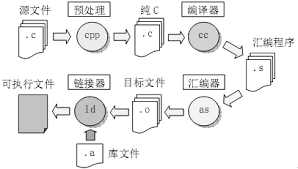电话面试被问到一个很基础很底层的问题,可是一时间不知道如何回答,总结网上的相关内容并加以验证,如果针对文章内容有任何疑问,欢迎留言讨论。
gcc编译流程分为4个步骤,分别为:
预处理(Pre-Processing)
编译(compiling)
汇编(Assembling)
链接(Linking)
示例代码main.c
#include <stdio.h>
int main()
{
printf("hello world!\n");
return 0;
}
(1)预处理阶段
在该阶段,编译器将上述代码中的stdio.h编译进来,并且用户可以使用gcc的选项“-E”进行查看,该选项的作用是把源代码进行预处理。
预处理器根据以字符#开头的命令(directives),修改原始的C程序。如helloworld.c中的#include
gcc -E helloworld.c -o helloworld.i
选项“-o”是指目标文件,“-i”文件为已经过预处理的C原始程序。以下列出了helloworld.i文件的部分内容:
# 411 "/usr/include/stdio.h" 3 4
# 1 "/usr/include/secure/_stdio.h" 1 3 4
# 31 "/usr/include/secure/_stdio.h" 3 4
# 1 "/usr/include/secure/_common.h" 1 3 4
# 32 "/usr/include/secure/_stdio.h" 2 3 4
# 42 "/usr/include/secure/_stdio.h" 3 4
extern int __sprintf_chk (char * restrict, int, size_t,
const char * restrict, ...);
# 52 "/usr/include/secure/_stdio.h" 3 4
extern int __snprintf_chk (char * restrict, size_t, int, size_t,
const char * restrict, ...);
extern int __vsprintf_chk (char * restrict, int, size_t,
const char * restrict, va_list);
extern int __vsnprintf_chk (char * restrict, size_t, int, size_t,
const char * restrict, va_list);
# 412 "/usr/include/stdio.h" 2 3 4
# 2 "fun.c" 2
int main()
{
printf("hello world!\n");
return 0;
}
由此可见,gcc确实进行了预处理,它把“stdio.h”的内容插入到helloworld.c文件中了。
(2)编译阶段
接下来进行的是编译阶段,在这个阶段中,gcc首先要检查代码的规范性、是否有语法错误等,以确定代码实际要做的工作,在检查无误后,gcc把代码编译成汇编代码。用户可以使用“-S”选项来进行查看,该选项生成汇编代码。汇编语言是非常有用的,它为不同高级语言不同编译器提供了通用语言。如:C编译器和Fortran编译器产生的输出文件都是一样的汇编语言。
gcc -S helloworld.i -o helloworld.s
.section __TEXT,__text,regular,pure_instructions
.macosx_version_min 10, 13
.globl _main ## -- Begin function main
.p2align 4, 0x90
_main: ## @main
.cfi_startproc
## BB#0:
pushq %rbp
Lcfi0:
.cfi_def_cfa_offset 16
Lcfi1:
.cfi_offset %rbp, -16
movq %rsp, %rbp
Lcfi2:
.cfi_def_cfa_register %rbp
subq $16, %rsp
leaq L_.str(%rip), %rdi
movl $0, -4(%rbp)
movb $0, %al
callq _printf
xorl %ecx, %ecx
movl %eax, -8(%rbp) ## 4-byte Spill
movl %ecx, %eax
addq $16, %rsp
popq %rbp
retq
.cfi_endproc
## -- End function
.section __TEXT,__cstring,cstring_literals
L_.str: ## @.str
.asciz "hello world!\n"
.subsections_via_symbols
(3)汇编阶段
汇编阶段是把编译阶段生成的“.s”文件转化成目标文件,读者可以使用选项“-c”把汇编代码转化为“.o”的二进制目标代码了。如下所示:
gcc -c helloworld.s -o helloworld.o
(3)链接阶段
在成功编译之后,就进入了链接阶段。在这里涉及到一个重要的概念:函数库。
读者可以重新查看这个小程序,在这个程序中并没有定义“printf”的函数实现,且在预编译中包含进去的“stdio.h”中也只有该函数的声明,而没有定义函数的实现,那么是在哪里实现的“printf”函数的呢?答案是:系统把这些函数实现都做到了名为libc.so.6的库文件中去了,在没有特别指定时,gcc会到系统默认的搜索路径“/usr/lib”下进行查找,也就是链接到libc.so.6库函数中去,这样就能实现函数“printf”了,而这也就是链接的作用。
函数库一般分为静态库和动态库两种。静态库是指在编译链接时,把库文件的代码全部加入到可执行文件中,因此生成的文件比较大,但在运行时也就不需要库文件了,其后缀一般为“.a”。动态库与之相反,在编译链接时并没有把库文件的代码加入到可执行文件中,而是在程序执行时链接文件加载库,这样就可以节省系统的开销,动态库一般后缀名为“.so”,如前面所述的libc.so.6就是动态库。gcc在编译时默认使用动态库。
完成了链接之后,gcc就可以生成可执行文件了,如下所示:
gcc helloworld.o -o helloworld
运行该可执行文件,出现正确结果
./helloworld
hello world!
可以通过ldd查看所依赖的动态库。
ldd prints the shared objects (shared libraries) required by each program or shared object specified on the command line.
root@ubuntu:~# gcc -g -o hello hello.c
root@ubuntu:~# ldd hello
linux-vdso.so.1 => (0x00007fff4c589000)
libc.so.6 => /lib/x86_64-linux-gnu/libc.so.6 (0x00007f54da637000)
/lib64/ld-linux-x86-64.so.2 (0x00007f54daa01000)
-rpath和-rpath-link的区别是: -rpath选项指定的目录 包含在 可执行文件里,会在运行时被用到
-rpath-link指定的目录只影响链接时的搜索目录
打印GCC搜索库的路径
gcc --print-search-dirs
安装:/usr/lib/gcc/x86_64-redhat-linux/4.8.5/
程序:=/usr/libexec/gcc/x86_64-redhat-linux/4.8.5/:/usr/libexec/gcc/x86_64-redhat-linux/4.8.5/:/usr/libexec/gcc/x86_64-redhat-linux/:/usr/lib/gcc/x86_64-redhat-linux/4.8.5/:/usr/lib/gcc/x86_64-redhat-linux/:/usr/lib/gcc/x86_64-redhat-linux/4.8.5/../../../../x86_64-redhat-linux/bin/x86_64-redhat-linux/4.8.5/:/usr/lib/gcc/x86_64-redhat-linux/4.8.5/../../../../x86_64-redhat-linux/bin/
库:=/usr/lib/gcc/x86_64-redhat-linux/4.8.5/:/usr/lib/gcc/x86_64-redhat-linux/4.8.5/../../../../x86_64-redhat-linux/lib/x86_64-redhat-linux/4.8.5/:/usr/lib/gcc/x86_64-redhat-linux/4.8.5/../../../../x86_64-redhat-linux/lib/../lib64/:/usr/lib/gcc/x86_64-redhat-linux/4.8.5/../../../x86_64-redhat-linux/4.8.5/:/usr/lib/gcc/x86_64-redhat-linux/4.8.5/../../../../lib64/:/lib/x86_64-redhat-linux/4.8.5/:/lib/../lib64/:/usr/lib/x86_64-redhat-linux/4.8.5/:/usr/lib/../lib64/:/usr/lib/gcc/x86_64-redhat-linux/4.8.5/../../../../x86_64-redhat-linux/lib/:/usr/lib/gcc/x86_64-redhat-linux/4.8.5/../../../:/lib/:/usr/lib/